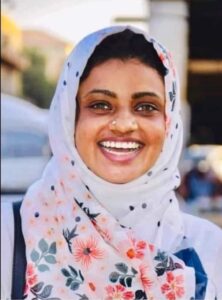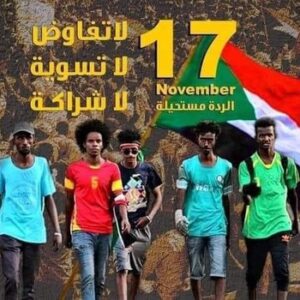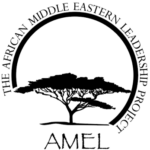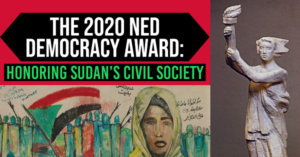
Sit Alnfor Ahmed, 24, year old nurse and WHRD was killed on November 14th protests in Bahry. Credit: ISHR
Despite a heavy-handed crackdown by Sudan’s military in the capital, Khartoum, and other cities, pro-democracy activists called today for an escalation of protests against last month’s military coup, a day after the deadliest security clampdown to date on demonstrators demanding the restoration of a civilian government, The Guardian reports.
“Now we are making consultations among the resistance committees about upping the escalation against the coup,” said a senior member of the resistance committees, which played a key role in the 2019 unrest that unseated former dictator Omar al-Bashir.
Widespread popular opposition to last month’s coup demonstrates the public’s rejection of military dictatorship. But more generous international financial and political support is vital if the country’s democratic transition is to resume and have a chance of succeeding, argue Ishac Diwan, a professor at the École Normale Supérieure, Paris, and Ibrahim Elbadawi, a former minister of finance and economic planning of Sudan
Contrary to popular narratives, financial inflows into Sudan have remained small to date, with about $800 million pledged in 2021. As a result, total budgeted government expenditures for 2021 are a mere $2.5 billion – equivalent to roughly 7% GDP – for a population of 45 million, they write for Project Syndicate.

Screengrab
Civil society groups today called for an end on attacks against Sudanese women protestors and Women Human Rights Defenders (WHRDs). Sudanese WHRDs and peaceful protesters have been facing growing violations since the coup, said a statement from Sudanese Women Rights Action, the Regional Coalition for Women Human Rights Defenders in MENA, International Service for Human Rights (ISHR), the Association for Women’s Rights in Development (AWID), Sisters Trust Canada and Front Line Defenders:
The internet blackout ongoing since October 25th has increased the risks faced by WHRDs in Sudan and severely restricted their efforts of monitoring and documenting the violations committed by the military and security forces all over Sudan. Women’s rights groups are working under complete closure of civil space and restrictions in movement and communication. WHRDs in Sudan are facing an unprecedented crackdown as the coup leaders are targeting journalists, members of resistance committees, union leaders, lawyers, students and civil society activists.
The UN Special Rapporteur Freedom of Association said he is “deeply concerned for the safety of all arbitrarily detained, as military continue to pick up activists from homes and hospitals, denying access to families and courts.”
“State of emergency does not justify rights abuses,” Clement Voule added. “Access to detainees & due process rights must be respected.”
Sudanese civil society groups, including partners of the National Endowment for Democracy (NED), have uniformly condemned the coup and called for the fragile democratic transition process to be restored:
 The African Middle Eastern Leadership Project calls on the public in the US and Europe to raise awareness about the situation by lifting up Sudanese activist voices and by contacting their elected representatives.
The African Middle Eastern Leadership Project calls on the public in the US and Europe to raise awareness about the situation by lifting up Sudanese activist voices and by contacting their elected representatives.- Calling for the inclusive transition in #Sudan. To help build consensus, Conflict Dynamics is highlighting areas of convergence and divergence across recent peace- and other agreements.
- The African Centre for Justice and Peace Studies calls for the immediate and unconditional release of all detainees and guarantee their physical safety and wellbeing, including granting access to their lawyers.
- Despite an ongoing Internet blackout, protests have been organized through neighborhood resistance committees, including through the distribution of leaflets and widespread graffiti, according to the Redress Trust.
- The HUDO Centre strongly condemns the ongoing coup and all actions that may jeopardize Sudan’s political transition.
 Military leader Gen. Abdel Fattah al-Burhan’s thin excuse that the coup was necessary to maintain stability is exposed by his refusal to transfer leadership of the joint sovereign council to civilian control—demanded by most Sudanese, adds Hala Al Karib, an activist, researcher and regional director for the Strategic Initiative for Women in the Horn of Africa.
Military leader Gen. Abdel Fattah al-Burhan’s thin excuse that the coup was necessary to maintain stability is exposed by his refusal to transfer leadership of the joint sovereign council to civilian control—demanded by most Sudanese, adds Hala Al Karib, an activist, researcher and regional director for the Strategic Initiative for Women in the Horn of Africa.
Instead, we have seen the architects of some of the country’s most violent episodes—including Burhan’s second in command Gen. Mohamed Hamdan “Hemeti” Dagolo who oversaw brutal Janjaweed militia in Darfur—stubbornly refuse to relinquish power, knowing that a democratic Sudan would hold them accountable for their historic crimes and threaten their illicit economic networks, she writes for Newsweek.
The civil society groups’ statement made several demands:
- We call on the Sudanese government to immediately release women protesters and WHRDs in detention, and provide health services to those injured.
- We call on the Sudanese government to immediately end the targeting of WHRDs, women’s rights groups and women protesters and protect the rights of WHRDs to advocate and promote women and human rights.
- We call on the United Nations Security Council to take action to ensure protection of women in conflict areas and urge the parties involved in the Juba peace agreement to comply with the provisions of the agreement related to the UNSC No. 1325, including ensuring effective, meaningful and genuine participation of WHRDs, women activists and women peacebuilders in the peace agreement.
- We call on the newly appointed expert on Sudan Adama Dieng to conduct an immediate investigation of the violations and gender based violence against women protesters and WHRDs, and engage in inclusive and wide consultations with civil society including women human rights defenders.
- We call on relevant UN Special Procedures, in particular the Special Rapporteur on Violence against Women, the Working Group on Discrimination against Women and Girls, the Special Rapporteur on the situation of human rights defenders and the Special Rapporteur on freedom of peaceful assembly and of association, to request a visit to Sudan and to issue a statement condemning the increasing violations against WHRDs and women protesters and women rights groups in Sudan. RTWT







